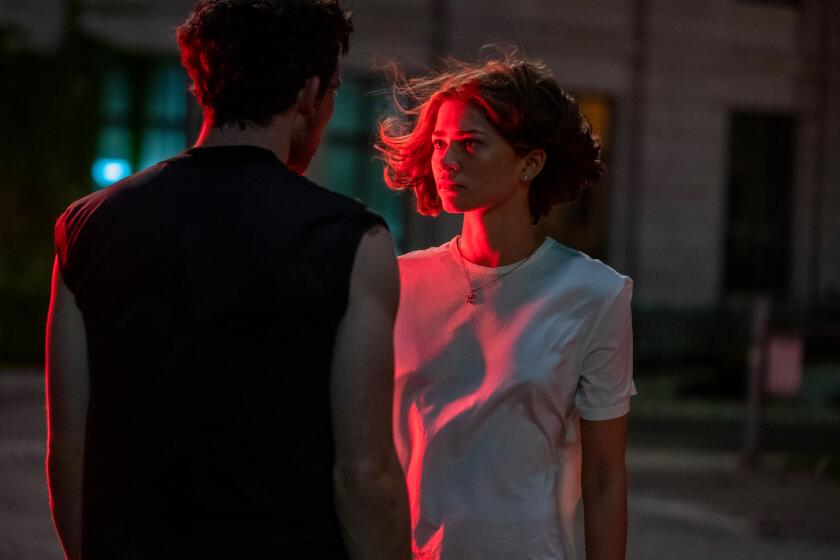How Brian Helgeland came to make Jackie Robinson movie ‘42’
For some directors, it’s a bolt of inspiration that prompts them to make their movie. For others, it’s a serendipitous phone call outside the Lincoln Tunnel.
It went down pretty much the second way for Brian Helgeland, the Oscar-winning screenwriter of “L.A Confidential” who wrote, and was behind the camera for, the surprise baseball hit of the season, Jackie Robinson biopic “42.”
The Massachusetts native was riding a bus on a roots trip of sorts to Brooklyn, where his father had grown up, when he received a call from the financier Thomas Tull. Tull had just persuaded Jackie Robinson’s widow Rachel to make a movie about her husband’s story, and he wanted Helgeland to write and direct it.
REVIEW: Pleasing ‘42’ has Jackie Robinson’s number
Helgeland wasn’t a die-hard baseball fan. He liked the idea of a story about a man as iconic as Robinson but wasn’t sure a story of an unadulterated hero was the right assignment for him — especially considering it would be his first major feature as a director.
But whatever doubts he had about tackling this project disappeared when, still on the phone with Tull, he passed a phone-booth PSA that displayed a picture of — who else? — Jackie Robinson.
“I don’t know if I believe in signs. But it was a little weird,” he said, laughing over breakfast at a Santa Monica cafe recently.
Soon Helgeland was meeting with Rachel Robinson. After some back and forth — she wanted a biopic that trained an eye on Robinson as a boy as well as a post-baseball figure, while Helgeland felt the story needed to focus tightly on the 1947 season — they came to an understanding. (Robinson basically acceded to Helgeland’s logic that this would feel more urgent.)
As Helgeland wrote the script, he scarfed up biographies and checked in with Rachel and Ralph Branca, the last surviving member of the ’47 Dodgers, to learn more details of Robinson’s life.
Helgeland said he was surprised by how much battle there was still to be fought after that season.
“As a kid you hear the story and it’s like ‘once he hops on the field he stops segregation in baseball.’ What I didn’t realize was how much still had to be done in the ‘50s and ‘60’s,” Helgeland said. “This was like a beachhead at Normandy. He just gave everyone else a place to fight from.” Larry Doby, of course, joined the majors the following year. But the battles with bigoted managers and players, and trips to inhospitable cities, particularly in the South, continued.
One of the most poignant moments in the film comes when Robinson, verbally abused by Phillies manager Ben Chapman, takes a bat to the dugout wall when he thinks no one is watching. The scene is invented — Rachel Robinson and Branca both gave Helgeland blank stares when asked about the moments Jackie lost his cool; in their experience it just didn’t happen. But Helgeland said he felt comfortable inserting it because it was reasonable to assume Robinsin did let out his frustration when he thought he was alone.
Some filmgoers might have taken note of the low arc of Robinson’s character, who isn’t very different at the end of the film than he is at the beginning.
PHOTOS: Game-changing baseball movies
But Helgeland said he saw precisely in that unwavering line Robinson’s appeal.
“It’s sort of this movie rule that your character has to change, when all my favorite movies are rooted in characters that don’t change,” he said. “Gene Hackman doesn’t change at the end of ‘The French Connection.’ If anything, he’s more who he is. And Jackie doesn’t change. He knows who he is. It’s everyone around him that changes.”
Helgeland added, “Jackie forces everyone else -- like Pee Wee Reese, when he puts his arm around him -- to know who they were. He already knew who he was.”
Rachel Robinson, who had script approval, was somewhat involved in the development process. She was careful to keep an eye on the details, at one point asking Helgeland to change a scene so it didn’t suggest she didn’t know what a balk was.
“This movie was going to be how many generations might know him so she wanted to focus on it,” he said. They won’t necessarily pick up Arnold Rampersad’s biography or another book. But they might watch this movie.” Judging by the audience response so far, she was right; the movie has been a hit at the box office and garnered an A+ CinemaScore.
Major League Baseball celebrated Jackie Robinson day on Monday. There won’t be a No. 42 for much longer — when Mariano Rivera retires next year, you won’t see it as a regular number for any player. One gets the sense that “42,” on the other hand, will be around for quite a while.
ALSO:
Jackie Robinson’s widow says ‘42’ hits home
With ‘42,’ the history-lesson movie strikes again
Watching ‘42’ with children: Is the language too much for them?
Follow me on Twitter at https://twitter.com/ZeitchikLAT
PHOTOS AND MORE
Roger Ebert: Career in pictures
ENVELOPE: The latest awards buzz
PHOTOS: Greatest box office flops
More to Read
Only good movies
Get the Indie Focus newsletter, Mark Olsen's weekly guide to the world of cinema.
You may occasionally receive promotional content from the Los Angeles Times.







